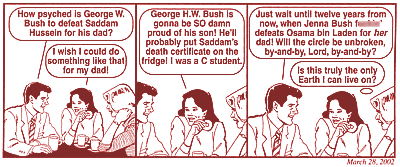
 |
||||
|
|
![[cover story] Fury and the Sound](graphics/nav_fury.gif) |
|
David Rees Gets
His (Bleep) On At first, Rees planned to update his existing absurdist Internet comic strip about office drones and karate pros. But times had changed since its last publication; the September 11 attacks had drastically altered the physical and emotional landscape of New York City. George W. Bush had become, for the first time in his presidency, wildly popular. And the language emanating from all corners of society–from the ubiquitous warblings of "God Bless America" to the Phillips 66 newspaper ad in which heavenly angels purportedly offered New Yorkers their condolences–had become for Rees far more absurd than anything he could have conjured for his clip-art characters. "I had this feeling of disgust at what I was doing," Rees says of that fateful night. "What was the point? It felt so ridiculous to do the comic. I had been carrying around anxiety and anger and frustration for weeks–not only because of September 11, but because it looked like we were about to start bombing Afghanistan, and nobody cared that there was a potential humanitarian catastrophe right around the corner. I remember thinking, 'Well, I've never made a political comic strip, but if there was ever a point in my life when I should, it's now.'" The four-letter words that exploded out of Rees' droll, cubicle-bound workers that October evening were singular and groundbreaking. "Oh yeah! Operation: Enduring Freedom is in the house!" exclaims a nameless office worker to his colleague in the first-ever frame of the new strip. Two frames later, the man elaborates on his initial proclamation, turning the government doublespeak on its head: "Yes! Operation: Enduring Our Freedom To Bomb The Living F–- Out Of You is in the house!!!"
A few strips later: "This war on terrorism is gonna rule! I can't wait until the war is over and there's no more terrorism!" the man says. "I know!" his coworker replies. "Remember when the U.S. had a drug problem, and then we declared a War on Drugs, and now you can't buy drugs anymore? It'll be just like that!" The comics were crass, irreverent, even inappropriate. They were also exactly what many people had been hungering for. Rees posted the strips, which assumed the title Get Your War On, and forwarded the link to a few friends. Within two weeks, his web site had received a staggering five million hits. "A lot of people e-mailed me to say it was the first time they'd laughed since September 11," Rees says. "Others wrote that it made them feel less isolated. The comics said what many people were feeling but hadn't been able to express." The early GYWO comics were dominated by grief, dread, overindulgence in alcohol, insomnia, anthrax anxiety, and a desire to see the United States vanquish the Taliban and Osama bin Laden. But as the months passed and the initial shock of the September attacks wore off, the comic's focus began to change. In a strip dated January 17, 2002, a man asks his coworker, "Is al-Qaeda obsessed with ruining American lives, or is Enron? Who am I supposed to want to bomb?" Subsequent strips touched on the IsraelPalestine conflict, John Ashcroft's proposals for domestic spying, and the nomination of Henry Kissinger to lead the 9/11 investigation. "I'm sure [Kissinger] has already drafted his final report," one character says archly. "'Over the past few years, there has been an unfortunate lapse in the number of innocent people being slaughtered as a direct result of my foreign policy initiatives! Can we please get back on track?'" Granted, GYWO makes an art out of going too far, and at least one letter writer has called Rees a communist. But fans say the strips, based on true events and actual rhetoric, demonstrate that political reality has itself gone too far. In one strip, a character notes that a CNN.com poll asks web surfers to vote on whether "al-Qaeda [is] sending coded messages to followers via video statements." The punch line–that an "astonishing" 100,000 people bothered to respond to the poll–is the unembellished truth and, for Rees, a comic's dream. Within weeks of his first GYWO comic, Rees was profiled in The New York Times ("Like Dilbert but Subversive and Online," read the headline), secured a book deal with the Brooklyn-based publisher Soft Skull Press (the Get Your War On collection was published last October with an introduction by author Colson Whitehead), and had become the nation's most well-known and biting humorist on the changed political scene. He has posted strips every few weeks since, netting some 25 million hits in 2002, and his success has only mounted: Rolling Stone magazine just hired him as a regular political cartoonist, and Marvel Comics included his work in its new series featuring nonviolent solutions to fights. "It was never my goal to make an antiwar comic that would convince people that a bombing campaign was misguided," Rees says. "Rather it was to get this off my chest, to overcome the sameness and lack of skepticism by the media. If I had wanted the strip to reach as many people as possible, I probably wouldn't have included the profanity. But it felt really right to me when I made it. I was angry. One way to pack as much rage as possible into those three little panels was to drop the f-bomb." Even if the comic is more catharsis than propaganda, Rees has found another way to promote change: He is donating all the author royalties from his book to the Adopt-A-Minefield campaign. He has already contributed $40,000 to a team of de-miners in Afghanistan; his gift will fund nearly three months of mine removal by 24 Afghan men and four German shepherds. Donating the money "was one of the best things I did all year," says Rees, who married Obie Sarah LaRiviere '97 last summer. "It made me feel less helpless. It reminded me that I actually can effect some kind of change on this earth." Sara Marcus '99 is the social justice editor of Heeb Magazine, a rock critic, and a musician. She lives in Brooklyn and is currently editing a book about the labor movement. |
 Sometime
after midnight on October 9, 2001–two days after the United
States began its military strikes in Afghanistan–New York temp
worker David Rees '94 sat down at his girlfriend's computer to create
a comic. He unwittingly embarked on a journey to fame.
Sometime
after midnight on October 9, 2001–two days after the United
States began its military strikes in Afghanistan–New York temp
worker David Rees '94 sat down at his girlfriend's computer to create
a comic. He unwittingly embarked on a journey to fame. 